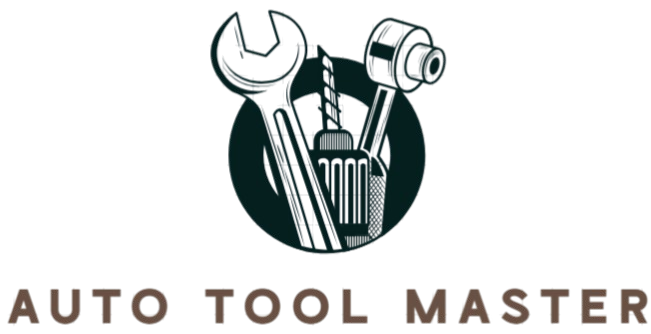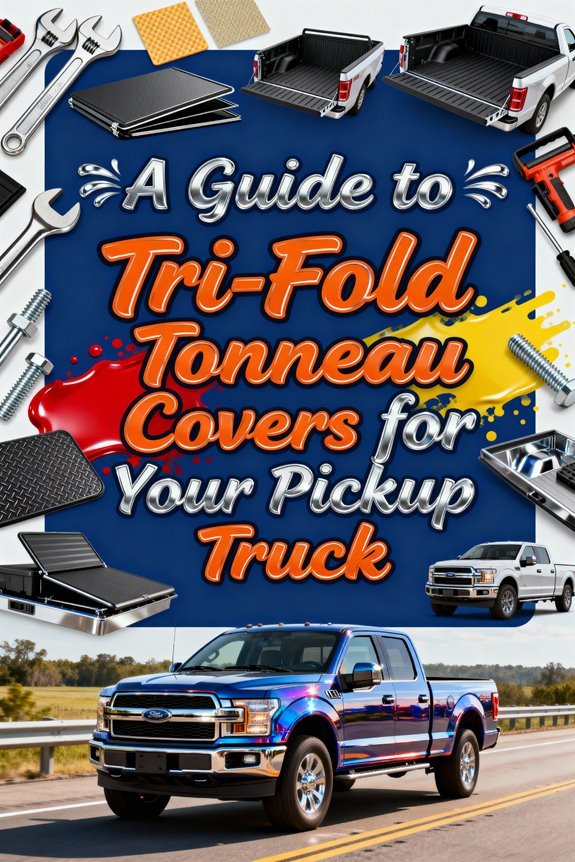Tri-fold tonneau covers feature a three-panel segmented design that offers flexible truck bed access through 20-24 inch panels. You’ll find two main types: soft covers using marine-grade vinyl ($269-$500) and hard covers with aluminum construction ($600-$1,600). Installation takes 30-60 minutes using no-drill clamp systems, while aerodynamic benefits can improve fuel efficiency by 4-10%. Hard covers provide superior security with 300-lb weight capacity and integrated locking mechanisms. This extensive guide explores installation techniques, material comparisons, and top-performing models to help you select the ideal configuration.
Understanding Tri-Fold Tonneau Cover Design and Functionality
Tri-fold tonneau covers utilize a three-panel segmented design that divides the truck bed into equal sections, typically measuring between 20 to 24 inches per panel depending on bed length. This configuration provides panel versatility, allowing partial or complete bed access through strategic folding positions. You’ll find these covers constructed from lightweight aluminum frames with vinyl or leather-grained fabric, while premium models feature fiberglass construction. The sleek aesthetics enhance your truck’s profile while maintaining functional utility. Installation methods include clamp-based systems with no-drill requirements, utilizing Speed-Klamp or similar mounting hardware. EPDM rubber seals and foam-rubber gaskets create weathertight barriers against precipitation and environmental elements. These covers integrate with existing bed accessories including liners, cargo nets, and tie-down systems while reducing aerodynamic drag for improved fuel efficiency. Many tri-fold covers feature security mechanisms that lock with the tailgate, providing theft protection when the truck bed is closed. During installation, torquing fasteners to specification ensures the mounting system remains secure without damaging the truck bed rails. Hard tri-fold covers can pivot against the rear window to provide complete bed access when needed.
Soft vs. Hard Tri-Fold Covers: Key Differences
When selecting a tonneau cover for your pickup truck, you’ll encounter two primary construction categories: soft and hard tri-fold designs. Hard covers utilize aluminum or reinforced plastics, providing superior theft resistance and lockable mechanisms that deter break-ins effectively. They deliver exceptional weather protection through rigid panels and tight seals, though their substantial weight reduces payload capacity and complicates installation. Conversely, soft cover advantages include lightweight construction that preserves fuel efficiency and simplifies handling. These fabric or vinyl designs fold quickly for convenient bed access and cost considerably less upfront. Lightweight soft covers can reduce drag by approximately 5%, potentially improving fuel efficiency by around 2%, especially during highway driving. However, hard cover disadvantages become apparent during removal procedures requiring tools and assistance. Soft covers sacrifice security—being vulnerable to cutting—and demand frequent maintenance to sustain water resistance. Soft covers typically feature a shiny, fabric-like appearance made from polyester or nylon materials, while hard covers present a more rigid aesthetic with thicker plastic or metal construction. Hard folding covers with rigid aluminum panels can often support substantial weight on top, with some models holding up to 300 lbs when closed. Your choice ultimately depends on prioritizing either maximum protection or operational convenience.
Materials and Construction Quality
Material selection directly influences your tonneau cover’s longevity, security, and weather resistance throughout its service life. Heavy-duty aluminum panels—often aircraft-grade and powder-coated—deliver corrosion resistance and UV protection while maintaining lightweight construction. Marine-grade vinyl dominates soft tri-fold applications, offering moisture protection through specialized water-repelling coatings. A material comparison reveals that composite materials and reinforced polymers provide superior impact resistance and fade prevention compared to standard vinyl.
Construction techniques determine waterproofing effectiveness. High-quality hard covers incorporate moisture-proofing between panels, bulkhead seals, and integrated rain channels with drain tubes. EPDM rubber seals along edges and side rails prevent water ingress. Reinforced hinges, locking mechanisms, and cross supports enhance structural integrity. Clamp-on installation systems reduce mounting damage, while warranties extending three years reflect manufacturer confidence in construction durability. During installation, carefully mark and drill any mounting holes to avoid damaging fuel lines, brake lines, or electrical components beneath the truck bed. Applying specialized automotive protectants after installation helps protect against UV rays and weather damage, extending the cover’s service life. The foldable design allows convenient access to different sections of the truck bed while maintaining protection for the remaining covered areas.
Security and Weather Protection Features
Beyond material durability and construction methods, your tonneau cover’s protective capabilities depend heavily on integrated security systems and weatherproofing elements. Hard tri-fold covers feature superior lock systems—typically automatic dual locks that engage when closed, often integrating with your tailgate latch. These mechanisms deter opportunistic theft by preventing easy cargo access. Some models utilize lockable pull cords or twist latches accessible only with an open tailgate.
Weather seals positioned around cover edges prevent water intrusion, while drainage channels in hard covers direct moisture away from your cargo. Reinforced hinges resist bending and water seepage. These covers shield against rain, snow, hail, UV rays, and wind. Many modern tonneau covers incorporate T-slot rails that allow you to mount compatible truck ladder racks and cargo systems, expanding your hauling capacity for bulky items like ladders, kayaks, and bikes while maintaining bed protection. To maximize the storage space underneath your cover, consider complementary accessories like sliding cargo boxes, under-cover toolboxes, or customizable organizers that keep gear secure and organized. The folding mechanism consists of three hinged panels that allow partial or full bed access depending on your cargo needs. However, tri-fold covers remain water-resistant rather than fully waterproof, so sensitive cargo may require additional waterproof containers for complete protection during transit.
Installation Process and Ease of Use
Although tri-fold tonneau covers offer robust protection features, their value depends on proper installation—a process most truck owners complete in 30-60 minutes without professional assistance. Start by cleaning the truck bed thoroughly with rubbing alcohol to remove grease and guarantee proper adhesion of weather stripping. Measure and cut seal strips precisely, then apply them flush against bed rails while pressing firmly to prevent water ingress. Position the assembled cover at the bulkhead, then attach clamps by hooking them under metal bed rails and tightening plastic knobs evenly. These installation tips guarantee peak performance. For maintenance practices, regularly inspect clamps and seals for wear, re-tighten nylox nuts as needed, and fold panels gently with handles locked to prevent damage during operation. Always check for debris on the panels before folding to avoid scratches or damage to the cover surface. Most no-drill clamp-on types require only basic tools like a socket set and torque wrench, making them accessible for DIY installation. Many covers include foam strips that seal gaps near the tailgate to enhance water resistance and protect your cargo from the elements.
Fuel Efficiency and Aerodynamic Benefits
Once properly installed, tri-fold tonneau covers deliver measurable aerodynamic advantages that directly impact your truck’s fuel consumption. By smoothing airflow over the bed, these covers eliminate turbulence that creates resistance, achieving drag reduction of approximately 12% in controlled testing. Real-world applications demonstrate fuel savings ranging from 4% to 10%, with highway driving yielding the most significant improvements. You’ll see ideal results with lightweight designs that minimize added weight while maximizing aerodynamic efficiency. Testing on vehicles like the Ram 1500 Classic recorded increases from 19.5 mpg to 21.1 mpg—a 7.7% improvement. While results vary based on driving conditions, vehicle design, and cover specifications, typical savings translate to 1.32 gallons per 500 miles, making tri-fold covers a practical aerodynamic enhancement for long-distance drivers. Hard covers are generally more aerodynamic and can provide better fuel savings compared to soft alternatives. These covers fold in sections, offering versatile partial or full bed access depending on your specific hauling needs. The sturdy construction of hard tri-fold covers also provides superior resistance to weather and potential theft compared to fabric alternatives.
Price Ranges and Value Considerations
When evaluating tri-fold tonneau covers, you’ll find entry-level models starting below $300, with options like the Rough Country Soft Tri Fold Tonneau Cover at $269.95 and the Smittybilt Smart Cover Soft Folding at $279.99 delivering essential functionality without premium pricing. These utilize lightweight aluminum frames with tear-resistant vinyl tops, offering tool-free installation and full weather sealing.
Mid-range models ($300–$500) provide improved cost efficiency through corrosion-resistant frames and enhanced materials. Soft tri-fold options like the Gator SFX and Extang Trifecta 2.0 allow for 2/3 bed access when the front panel is folded, balancing cargo flexibility with cover protection. Hard-folding covers ($600–$1,600) feature aluminum or composite panels with superior security and extended warranty options—the Gator EFX includes 3-year coverage. Premium models like the Rough Country hard low-profile trifold cover combine durability and weather resistance to protect your cargo investment. A quality tonneau cover can also enhance resale value by maintaining the truck bed’s condition and improving overall appearance. While soft covers may show wear after 2–3 years, their low replacement cost maintains value. Hard covers justify higher initial investment through reduced long-term ownership costs and maintained functionality.
Top Tri-Fold Tonneau Cover Models on the Market
Understanding value and pricing sets the foundation for examining specific models that deliver the best combination of features, durability, and performance. Top brands like BAKFlip lead with the G2 and MX4, both utilizing aluminum panels with patented latch systems and flush mounting for maximum security. UnderCover’s SE One Piece and Elite LX offer integrated prop rods and full bed access. For the best budget options, Gator’s SFX employs 24-ounce marine-grade vinyl with reinforced latches, while Extang’s Trifecta Signature 2.0 features rugged canvas construction. Worksport’s AL3 Pro stands out with quick-release systems and powder-coated aluminum. Hard covers from these manufacturers typically include 3-5 year warranties, with some extending to 10 years, ensuring long-term reliability and minimal wear. Installation is simplified with no-drill clamp systems that secure the cover without permanent modifications to your truck bed. These tri-fold designs utilize metal parts for stability while providing convenient access to your truck bed. The three hinged panels fold back on one another, allowing you to access your cargo partially or fully without removing the entire cover.

